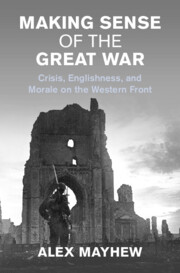Book contents
- Making Sense of the Great War
- Studies in the Social and Cultural History of Modern Warfare
- Making Sense of the Great War
- Copyright page
- Dedication
- Contents
- List of Figures
- List of Tables
- Acknowledgements
- Abbreviations
- Map of the Western Front
- Prologue
- Introduction
- Part I The Environment
- Part II Social Groups
- 3 Defining Duty
- 4 Imagining Home
- Part III Crisis and Morale
- Appendix Demographics of Six English Regiments in the BEF
- Bibliography
- Index
4 - Imagining Home
Englishness in the Trenches
from Part II - Social Groups
Published online by Cambridge University Press: 11 April 2024
- Making Sense of the Great War
- Studies in the Social and Cultural History of Modern Warfare
- Making Sense of the Great War
- Copyright page
- Dedication
- Contents
- List of Figures
- List of Tables
- Acknowledgements
- Abbreviations
- Map of the Western Front
- Prologue
- Introduction
- Part I The Environment
- Part II Social Groups
- 3 Defining Duty
- 4 Imagining Home
- Part III Crisis and Morale
- Appendix Demographics of Six English Regiments in the BEF
- Bibliography
- Index
Summary
Imagination was an essential component in the maintenance of morale. It was a coping mechanism, which drew men away from their present, and allowed them to access memories that helped them to feel connected to home and to England - its landscapes, peoples, and places. As subject, not citizen, soldiers their perceptions of England formed around parochial and meaningful visions, rather than abstract ideas like the state. Yet, regulars had a very particular impression of ‘home’, which drew on their military service and soldierly identities. On the other hand, reservists, volunteers, and later conscripts continued to feel embedded in their home communities, albeit mainly in their minds. These specific and personal relationships with the homeland were also nurtured by regimental culture, which, at least in infantry regiments, often preserved and celebrated attachments to a particular county or counties. The distance between men and their loved ones could leave them despondent, but the letters, parcels, and postcards that they received gave them joy and were often the substance of the imaginary worlds they created and fought for. Whilst soldiers did become increasingly embittered by perceived injustices, inefficiencies, and peace talk on the Home Front, it was their more parochial (and positive) visions of home that mattered most to them. Their imaginative realms were not just a source of motivation, they were also a cocoon to which they retreated when dreaming and daydreaming in trenches or behind the lines. They aided their endurance whilst also providing the greatest justification for their continued suffering.
- Type
- Chapter
- Information
- Making Sense of the Great WarCrisis, Englishness, and Morale on the Western Front, pp. 160 - 194Publisher: Cambridge University PressPrint publication year: 2024

